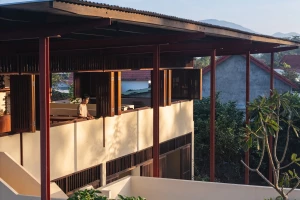After 400 tests in the Nevada desert without passengers, now for the first time the Virgin Hyperloop completed the fastest form of land-based travel with human passengers inside. Virgin Hyperloop partnered with BIG and Kilo to design the Pegasus pod that can be blasted through the 500 meter DevLoop test site to achieve hyperloop travel at the speed of over 1,000 km/hour.
The pod contains a forward-facing window for a view down the tunnel. Incremental rings at the front shape a spacy entry to the transport vehicle. Repeating soft forms and pill shaped cut-outs are used to create a sense of depth and speed.

The six square meters interior is custom built and designed with comfort and safety in mind. The seating with extended arms serves as entry aid as well as storage for safety equipment, oxygen and lighting. Seats can easily be disassembled for quick access to the rear. Rigorous safety-critical systems can detect any anomalies and trigger the appropriate emergency responses.

BIG and Kilo also defined a design language for future vehicles. While the demonstration model is set up for two seats, the production model will seat up to 28 passengers. Since Hyperloop travel occurs within a near vacuum environment, there is no need for aerodynamics in the design.

The engineered magnetic levitation together with the pressurized vessel makes Hyperloop far more energy efficient than traditional rail transit. The Pegasus pod can move individually allowing for on-demand travel.

The advancements made through the test and earlier announcement of the Hyperloop Certification Center (HCC), also a design by BIG that will be located in West Virginia, pave the way for Hyperloop systems around the world.

































